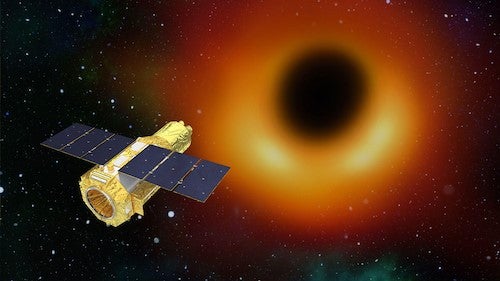Editor:
Brandon Sweet
University Communications
bulletin@uwaterloo.ca
Countdown to XRISM

By Jordan Flemming. This article was originally published on Waterloo News.
In a quest to decipher the enigmatic power of black holes and the intricate role they play in galaxy growth and structure — Waterloo scientists are gearing up for a much-anticipated launch. The X-Ray Imaging and Spectroscopy Mission (XRISM), led by the Japan Aerospace Exploration Agency (JAXA) in collaboration with NASA and global partners, is poised for liftoff on August 26, 2023.
The mission aims to delve into the heart of supermassive black holes and their profound influence on the universe's evolution.

Brian McNamara, chair and professor in the Department of Physics and Astronomy and his team, have been an integral part of the XRISM mission since its precursor, the Hitomi satellite project. Launched on February 17, 2016, Hitomi experienced a series of technical issues shortly after reaching orbit. The satellite was later lost due to a malfunction in its altitude control system.
Despite losing Hitomi after just five weeks, the Hitomi team, of which McNamara was a key member, was able to gather enough data to produce several high-impact research papers published in Nature, The Astrophysical Journal, and other notable publications. Deemed a top priority for the insightful data it could gather, JAXA and NASA patched together funding to develop and launch a replacement for Hitomi, the new and improved XRISM satellite.
Central to the XRISM mission is an advanced telescope equipped to detect X-rays emitted by celestial bodies. These high-energy X-rays offer insights into the behavior of superheated gases enveloping supermassive black holes, galaxies and galaxy clusters.
"XRISM has a remarkably sensitive spectrometer, and it allows us to see the spectral lines emerging from electronic transitions, indicating elements like iron, oxygen, nickel and manganese," McNamara explains. These spectral lines function as cosmic fingerprints, revealing vital information about matter and gas composition and origin, temperatures and other useful scientific indicators.
Over the years, McNamara has been a driving force behind understanding cosmic quandaries, with a particular emphasis on black holes.
A pivotal objective of the mission is to decipher the intricate connection between black holes and the growth of galaxies. "What we've learned over the last 20 years, is that we now know supermassive black holes control the destiny of galaxies,” McNamara says.
The energy unleashed during the black hole's accretion process heats up surrounding gases, influencing a galaxy’s star formation rate. McNamara hypothesizes that black holes strike a delicate balance between promoting and quenching star formation in cycles that oscillate over hundreds of millions of years. XRISM could help expound this theory.
Beyond unraveling the intricate dance of black holes and galaxies, the XRISM mission aims to tackle other perplexing cosmic riddles.
One puzzle is the abundance of chemical elements interspersed between galaxies and galaxy clusters. McNamara remarks, "There's more energy in the gas and more elements than you would expect, just from gravity alone. This is a long-standing problem. And those two problems have been hanging around for a long time." The mission's high-resolution spectrometer is positioned to delve into these mysteries, offering insights into the origins of these cosmic elements and energy.
Following its launch, the XRISM satellite will undergo rigorous testing and calibration to ensure its instruments are primed for action. The initial phase will focus on observations by the science team led by McNamara, targeting diverse assortment of celestial objects. As the mission unfolds, opportunities for guest observers worldwide will expand the scope of research endeavors.
McNamara’s enthusiasm for the mission's impact on astrophysics is unmistakable. “Black holes are remarkably efficient energy generators. And we think that those holes control the growth of giant galaxies. And that's the primary issue I've been working on for 20 years and it’s been a lot of fun,” he remarks.
With its distinctive capabilities, the instrument holds the potential for breakthroughs in our understanding of black holes and galaxies, and their intricate interplay in shaping the cosmos. McNamara’s unwavering commitment, coupled with collaborative efforts from global space agencies, promises to usher in an exciting era in astrophysics.
Banner photo credit: NASA's Goddard Space Flight Center Conceptual Image Lab
Siv Sivaloganathan wins CAIMS-Fields Industrial Mathematics Prize

This article was originally published on the Faculty of Mathematics website.
Congratulations to Siv Sivaloganathan, professor of Applied Mathematics, on winning a prestigious Canadian Industrial & Applied Mathematics Society (CAIMS)-Fields Industrial Mathematics Prize. Sivaloganathan is the twelfth recipient of the annual award, which recognizes “exceptional research in any area of industrial mathematics conducted in Canada.”
Sivaloganathan is a leading expert in the field of Mathematical Medicine, which seeks to apply mathematical techniques and tools to solving problems in health and medicine.
Sivaloganathan was the founding director of the Center for Mathematical Medicine at the Fields Institute. He also did foundational work on mathematical models of the brain, leading to a better understanding of hydrocephalus and its treatment.
“The award is some sort of recognition,” he says, “that something I initiated many years ago – that is, the field of Mathematical Medicine in a Canadian context – has value and the potential to have real impact on the lives of Canadians.”
Sivaloganathan has been at the University of Waterloo for thirty-three years, and recently served as chair of the Department of Applied Mathematics for more than six years. “The wonderful thing about having a dedicated Faculty of Mathematics is that you have expertise over the whole spectrum of mathematics, essentially at your fingertips,” he says.
Today, he and many of his Applied Math colleagues are using mathematical medicine to better treat cancer. Sivaloganathan is currently focused on the modelling of High Intensity Focussed Ultrasound (HIFU), as well as “the plethora of phenomena that arise from its application.” HIFU, he says, “has the potential to become a most effective therapeutic modality for solid cancers, with minimal to no side effects – and it is non-invasive. These are exciting times!”
The CAIMS citation noted Sivaloganathan’s extensive contributions to the field of Mathematical Medicine as well as his innovative collaborations with clinicians and medical researchers. “Professor Siv Sivaloganathan is a talented and accomplished biomathematician, who has made
Significant contributions in several areas of applied mathematics, and is very clearly a leader in the field of Mathematical medicine,” they said.
You can read more about Sivaloganathan’s work on his website. You can read more about the Canadian Industrial & Applied Math Society on their website.
Upcoming office closure
The Human Resources reception desk in East Campus 1 will be closed on Thursday, August 17. Regular operations will resume Friday, August 18.
Link of the day
Where were you in '62? American Graffiti at 50
When and Where
NEW - Warriors Game Day Tickets: Season Passes, Black and Gold Alumni Passes and Single Game Tickets now available for the 2023-24 varsity season. Purchase your tickets today!
Waterloo Warriors Youth Camps. Spring and Summer camps available for Boys and Girls ages 5-18. Baseball, Basketball, Football, Volleyball, Hockey and Multi-Sport and Games. Register today.
Student Health Pharmacy in the basement of the Student Life Centre is now offering Covid booster shots (Pfizer and Moderna) and flu shots. Call 519-746-4500 or extension 33784 for an appointment. Walk-ins always welcome.
Final examination period, Friday, August 4 to Saturday, August 19.
Ontario Mennonite Music Camp, Sunday, August 13 to Friday, August 25, Conrad Grebel University College.
Technology Governance Summer School, Monday, August 14 to Friday, August 18, Balsillie School of International Affairs.
Centre for Teaching Excellence New Faculty Teaching Days, Tuesday, August 15 to Friday, August 18. Registration is required.
Sustainability Office Garlic Mustard Pull, Thursday, August 17, 11:00 a.m. to 1:00 p.m., DWE parking lot. Sign up today.
Land Skills for Wellness and Sustainability Project: Weaving Together with the Land Nature Walk, Saturday, August 19, 10:00 a.m. to 12 noon.
NEW - Quest will be down for scheduled maintenance, Sunday, August 20, 6:45 a.m. to 1:00 p.m.
You+Waterloo Optometry Speaker Series featuring Dr. C. Lisa Prokopich, “Dry Eye Management,” Thursday, August 24, 6:30 p.m., Borealis Grill and Restaurant. RSVP by Friday, August 18.
Celebrating 50 years - Renison Residence Reunion, Friday, August 25 to Sunday, August 27.
Co-operative work term ends, Friday, August 25.
Waterloo Pharmacy Annual Alumni and Friends Golf Invitational + Dinner, Monday, August 28, Grey Silo Golf Course.
International Student Orientation, Thursday, August 31.
Fall first-year Residence Move-In, Thursday, August 31 to Sunday, September 3.
Land Skills for Wellness and Sustainability Project: Connecting to the Land, Thursday, August 31, 5:00 p.m. to 7:00 p.m.
Fall Orientation, Saturday, September 2 to Saturday, September 9.
Labour Day, Monday, September 4, most university operations and buildings closed.
Co-operative work term begins, Tuesday, September 5.
Management Sciences seminar featuring Margot Racat, IDRAC Business School, “Haptics and Need for Touch in Retail Environments: Bringing Back Tangibility to Consumers?” Tuesday, September 5, 11:00 a.m. to 12 noon, CPH 4335.
Lectures and classes begin, Wednesday, September 6.
Music Ensemble Auditions start on Wednesday, September 6.
When and Where to get support
Check out the support listings for faculty, staff and students.